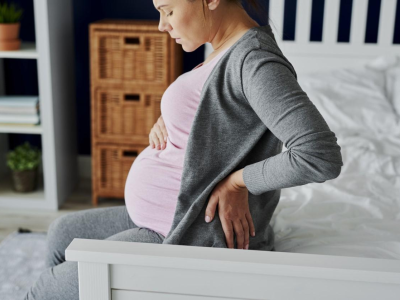Oct 4, 2010 (CIDRAP News) – In a study that could help bolster seasonal flu vaccination levels in pregnant women, researchers who monitored newborns over three flu seasons found that babies born to vaccinated mothers had lower risks of infections and hospitalizations and had higher antibody levels during their first few months of life.
The study was conducted from November 2002 to September 2005 in the US southwest at the Navajo and White Mountain Apache reservations, where rates of acute respiratory infection in children are higher than in the general US population. The findings appear in an early online edition of Archives of Pediatric and Adolescent Medicine.
Women and their newborns were recruited at birth at seven hospitals on the reservations, six from the Navajo reservation and one from the White Mountain Apache location. The study included 1,169 mother-baby pairs, of which 1,160 pairs had serum collected and included in the study analysis. Though seasonal flu vaccination has been recommended for pregnant women for the past several years, fewer than 10% of eligible pregnant women on the reservations had been immunized before the study began.
Researchers collected detailed information from mothers at study enrollment and at the end of each flu season. Parents were asked to contact researchers when infants had medical visits for respiratory, diarrheal, or febrile illnesses. The investigators also conducted active surveillance for flulike illnesses at the hospitals and reviewed medical records to identify missed illness episodes.
Blood samples were collected from mothers at or within 14 days of delivery, and umbilical cord blood was collected at delivery or from infants within 14 days of delivery. Venous blood samples were collected from infants at 2 to 3 months and 6 months.
Nearly half (49%) of babies were born to mothers who had received the seasonal flu vaccine during pregnancy.
Among the 1,160 infants, researchers recorded 908 flu-like illness episodes, about 17% of which required hospitalization. Some of the infants had at least one outpatient flulike illness in addition to the event that prompted hospitalization. Incidence of flu-like illness was 7.2 per 1,000 person-days for babies of unvaccinated mothers and 6.7 per 1,000 in those born to vaccinated women.
Researchers found a 41% reduced risk of lab-confirmed flu infections and a 39% reduced risk of flu hospitalization in babies of vaccinated mothers. They also found that infants born to vaccinated women had significantly higher antibody titers at birth and at 2 to 3 months of age for all eight flu viruses they tested for. By 6 months antibody titers had decreased, and levels seen in vaccinated and unvaccinated babies were similar.
Though the authors didn't evaluate mothers' illnesses during pregnancy or after delivery, they did look at the relationship between the strains to which the infants had antibodies and any flu infections that occurred. They found a correlation between higher antibody titers and reduced risk of flu infection in young babies.
They concluded that their findings are consistent with evidence from a recent trial in Bangladesh that was reported earlier this year in the New England Journal of Medicine, the first to show serologic evidence that maternal flu vaccination benefits the youngest babies.
"These findings provide support for the added benefit of protecting infants from influenza virus up to 6 months, the period when infants are not eligible for influenza vaccination but are at highest risk of severe influenza illness," the researchers conclude, adding that the findings are particularly relevant to the 2009 H1N1 pandemic, which had a substantial effect on pregnant women and caused high hospitalization rates in young infants.
In an editorial that accompanied the study, two flu vaccine experts from Seattle write that vaccinating mothers against seasonal flu is a promising strategy to protect fetuses and newborns, given the transmission of maternal antibodies through the placenta or breast milk. The authors are Justin R. Ortiz, MD, and Kathleen M. Neuzil, MD, MPH, both of whom are with the Vaccine Development Global Program at PATH and at the Department of Medicine at the University of Washington.
They write that the study confirms the ability of flu vaccines to reduce the illness burden for infants: "The consistency of the findings in the Bangladesh and White Mountain Apache and Navajo studies, conducted in disparate environments, is remarkable and encouraging."
Ortiz and Neuzil note that uptake of flu vaccine during pregnancy in the United States has been poor, despite a federal recommendation that has been in effect since 1997. The blame misconceptions about the seriousness of the disease and the safety of the vaccine, all of which they said have been refuted by substantial data.
They comment that flu vaccination programs for women in developing countries may be feasible, especially if programs leverage tetanus vaccine initiatives, which also target maternal vaccination, that are already in place.
The findings of both studies could boost maternal flu vaccination efforts in countries where recommendations are already in place and influence the adoption of the recommendation in countries that haven't yet addressed the issue, Ortiz and Neuzil add.
"Maternal influenza vaccination targets two high-risk groups with one vaccine dose—we can't afford not to act," they conclude.
See also:
Eick AA, Uyeki TM, Klimov A, et al. Maternal influenza vaccination and effect on influenza virus infection in young infants. Arch Pediatr Adolesc Med 2010 Oct 4; early online publication [Abstract]
Ortiz JR. Neuzil KM. The promise of maternal vaccination to prevent influenza in young infants. Arch Pediatr Adolesc Med 2010 Oct 4, editorial, early online publication [Abstract]



















